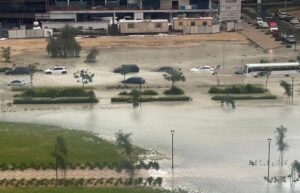Physical Address
23,24,25 & 26, 2nd Floor, Software Technology Park India, Opp: Garware Stadium,MIDC, Chikalthana, Aurangabad, Maharashtra – 431001 India
Physical Address
23,24,25 & 26, 2nd Floor, Software Technology Park India, Opp: Garware Stadium,MIDC, Chikalthana, Aurangabad, Maharashtra – 431001 India

Dubai experienced severe flooding after receiving an astonishing amount of rainfall equivalent to almost two years’ worth within a single day on Tuesday.
The UAE experienced the most significant rainfall in the last 75 years, according to the National Center of Meteorology (NCM). NCM’s Twitter post stated that In less than 24 hours, the Khatm al-Shakla area in Al Ain received 254.8 mm of rainfall, representing a remarkable occurrence in the country’s climatic record.
The intensity of the downpour led to significant disruptions, prompting the second busiest airport globally- the Dubai International Airport to temporarily divert some flights and cease operations for nearly half an hour.
Roads transformed into torrents, causing immense flash flooding that submerged homes, businesses, and even the airport’s tarmac.
Between 10 p.m. local time Monday and 10 p.m. local time Tuesday, the Dubai Meteorological Office recorded an astounding 6.26 inches of rainfall in the United Arab Emirates city. According to the World Meteorological Organization, this amount is double the average annual rainfall for Dubai, which stands at 3.12 inches. Such a deluge occurred so rapidly and intensely that it compelled some drivers to forsake their vehicles, confronted with rising floodwaters that transformed roads into flowing rivers.
This unprecedented event highlights the vulnerability of Dubai’s infrastructure to extreme weather events, exacerbated by the region’s typically arid climate. The rapid and heavy rainfall overwhelmed the city’s drainage systems, turning streets into rivers and leaving motorists stranded. Social media footage depicted water cascading through malls and flooding the ground floors of residential buildings.
The severity of the flooding serves as a stark reminder of the impact of human-induced climate change. As climate change continues unabated, we can expect an increase in extreme rainfall. Warmer atmospheric temperatures allow the air to hold more moisture, which is released during heavy rainfall events, leading to more severe flooding. The recent heavy rainfall in Dubai and flooding in neighbouring regions underscore this trend.
Experts discussed the recent severe flooding in Dubai and highlighted the connection to human-induced climate change on platforms like Twitter. WFLA-TV Tampa Bay’s Chief Meteorologist and Climate Specialist Jeff Berardelli posted a thread on Twitter emphasizing the increased frequency and intensity of extreme rainfall events due to climate change and the vulnerability of coastal cities like Dubai to rising sea levels. The tweets also mention studies projecting future increases in rainfall over the Arabian Peninsula and the potential submersion of significant infrastructure by the end of the century.
The vulnerability of the Arabian Peninsula to climate change is highlighted in the NCM’s Annual Climate Assessment 2022 for the UAE. The report emphasizes the influence of various teleconnection patterns on the regional climate, including the El Niño-Southern Oscillation (ENSO) and Indian Ocean Dipole (IOD). It also notes a warming trend in the UAE’s climate compared to the long-term average.
A study had predicted divergent trends in precipitation across the Arabian Peninsula, with the southern region, including the UAE, likely to experience increased rainfall. However, despite these projections, the NCM report for 2022 indicated below-normal rainfall activity in the UAE, with certain regions experiencing deficient rainfall due to persistent La Niña conditions.
According to a study by researchers from the Stockholm Environment Institute, much of Dubai’s infrastructure may face the threat of submersion by the year 2100. The study suggested that up to 85% of the population and 90% of the coastal infrastructure throughout the UAE are vulnerable to the impacts of climate change, including rising sea levels.
While the extent of global warming and its resultant sea level rise are uncertain, some degree of increase will inevitably occur. The uncertainty stems from the unpredictability of political actions to mitigate greenhouse gas emissions. Despite this uncertainty, the scientific consensus on climate change remains unwavering.
Time is of the essence, as even a modest rise of ten feet would result in significant loss for Abu Dhabi and Dubai, with over 800 square kilometres of land likely to get submerged in Abu Dhabi alone. However, if sea levels rise by thirty feet the entire UAE capital of Abu Dhabi and Dubai would be completely submerged.
Urgent action is needed to mitigate greenhouse gas emissions and adapt to climate change’s impacts, as even a modest sea level rise could have devastating consequences for the region’s urban centres and infrastructure.
References
https://www.wrsc.org/story/all-dubai-underwater-climate-change
https://abcnews.go.com/International/dubai-flooding-heavy-rainfall/story?id=109321601
https://www.ncm.gov.ae/resources/climate-reports/ncm-annual-climate-assessment-2022-s.pdf
Image: Twitter